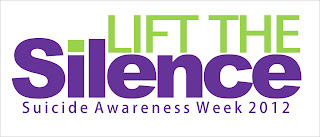Many people believe that during the holiday season more people end their lives, but that is not the case and is a stereotype perpetuated by many factors including media coverage. This blog post is not lay blame anywhere including the media; we know that reporting on suicides is a very difficult topic and we commend those that do, because they are helping to lift the silence surrounding suicide. This post is more about saying that Christmas is NOT the only time someone will die by suicide.
On the 24 Hour Distress Line the number of calls received in 2011 remained pretty steady throughout the year, with no significant increase during Quarter 4 as suggested by the stereotype that people struggle more during the holiday season.
While this information might be interesting, why is it important? Because many people struggle throughout the year, and we need to let them know they are not alone, and “whatever the question, suicide is not the answer” as Bob Rae said at the recent Canadian Association for Suicide Prevention in Niagara Falls this past year.
For those that struggle with thoughts of suicide, they may experience “triggers” following many losses or changes; as we say change is a loss, even if it is a positive change. The trigger, or the straw that broke the camel’s back can really be anything; from a small change in your everyday routine, to a loss of a relationship or job. Many people have coping strategies that work normally but this time they don’t, and that is where a person can go into crisis. With time and effective coping mechanisms many people come out of their crisis stronger. Sometimes the problem is identifying what those effective coping strategies can be for you; this is where the 24 Hour Distress Line or friends and family can help. Sometimes talking it out helps organize your thoughts, and allows you to build new coping strategies; you can also reflect on what has worked in the past and use those to manage the crisis you are in.
Some suggestions for coping mechanisms that may work for you are:
- Engaging in physical activity – this can be anything, including working out, playing sports, dancing or tobogganing (a very Canadian option!).
- Spending time outside – one of the best features of Edmonton is the river valley, take some time to enjoy the natural beauty your community has to offer.
- Quiet Activities – more low-key activities that can include journaling, reading, watching TV or crafting.
Finally reaching out to friends and family, possible a doctor, counselor or priest, can be an important step in coping. Finding someone you trust to reach out to and talk about what’s going on can do a lot of good in reducing feelings of isolation and increasing feelings of control.
Many people experience feelings of loss, hopelessness, and frustration. Know that you are not alone; reach out and take that first step, the 24 Hour Distress Line is always available to help, 780-482-HELP (4357).
Additional crisis services can be accessed through www.CrisisSupportCentre.com

